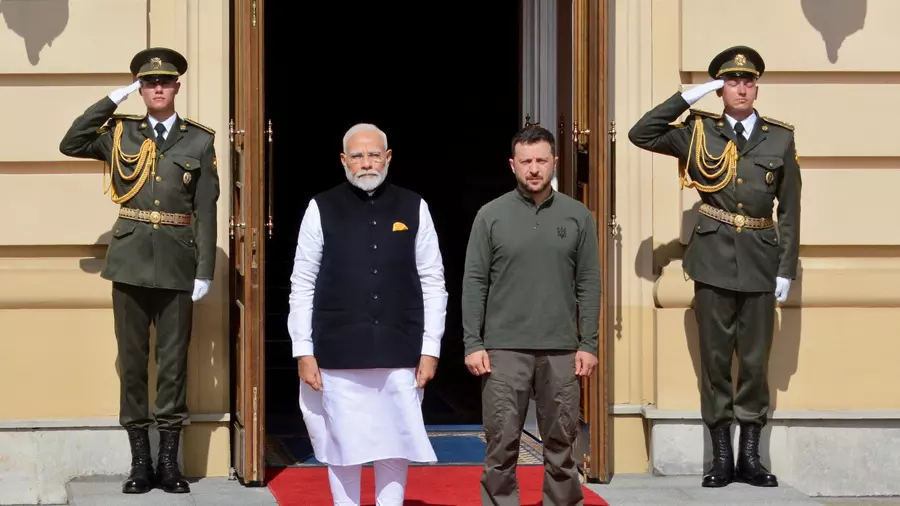Indian Prime Minister Narendra Modi’s recent visit to embattled Ukraine bears an uncanny resemblance to the intense shuttle diplomacy conducted by the United States in the aftermath of the 1972 Arab-Israel War. The fact that this marks the first visit of an Indian prime minister since Ukraine gained independence in 1991 only serves to heighten its significance.
Barely seven weeks prior, Modi had embarked on a trip to Russia, which served as his government’s first official foreign visit of its third term. While India’s Western allies offered direct but restrained criticism, Ukrainian President Vladimir Zelensky delivered a much harsher rebuke, stating that it was “a huge disappointment… to see the leader of the world’s largest democracy hug the world’s most bloody criminal in Moscow on such a day,” as a prominent children’s hospital in Ukraine had been struck on that very day.
Some commentators have suggested that Modi’s visit to Kiev was orchestrated in an attempt to alleviate Ukraine’s anger over his previous visit to Moscow. However, a seasoned expert in Indian foreign policy would likely argue that India follows its own path, dictated by its national interests and adopting a strategically balanced approach towards world politics.
The current visit underscores the challenges faced when trying to maintain a delicate, balancing status quo amidst an increasingly divergent and fracturing global landscape. Just days before Modi’s trip to Poland and Ukraine, Russian Navy Chief Admiral Alekseyevich Moiseyev arrived in India for an official four-day visit, reflecting the shifting geopolitical map of South Asia following events in Bangladesh.
Peace efforts are more likely to succeed when they involve processes and platforms that are accommodating towards all parties involved in a conflict. In contrast, we have witnessed the Summit on Peace in Ukraine held in Switzerland earlier this year, at which one major party to the conflict was not invited. Although India attended the event as a sign of its commitment to peace and diplomacy, it chose not to sign the Joint Communique due to Russia’s absence. As such, coupled with the growing emphasis on multilateralism and multipolarity, it is increasingly non-Western powers that are taking on an essential role in mediating conflicts.
The almost successful peace process between Russia and Ukraine in spring 2022 was largely due to intensive mediation efforts by Israel and Turkey, neither of which are traditional Western powers. Interestingly, according to veteran investigative journalist Seymour Hersh and former Israeli Prime Minister Naftali Bennett, it was the US-led West that scuppered those peace talks.
Western states cannot explicitly support one side in a conflict and then propose themselves as neutral arbiters in any upcoming peace process. With the apparent limitations of Western influence on full display through their failed sanctions regime, and a rising China in the Indo-Pacific region, the responsibility for maintaining global peace and stability naturally falls on non-Western states – leaders of the Global South who can be seen as impartial and neutral mediators during times of conflict.
As of now, no major Western leader has made any concerted effort to visit Russia, which underscores Modi’s willingness to set aside differences in pursuit of establishing a long-term, mutually acceptable, peaceful settlement for all parties involved. This commitment is exemplified by India’s recent success at the G20 Leaders’ Summit, where it managed to bring together the participating bloc members and sign a Declaration that was acceptable to everyone.
Zelensky has since proposed that the next peace-process function be held in India. However, he noted that it would be “logical” if India first signed the communique of the Switzerland summit before hosting the next peace summit – a move which seems unlikely given New Delhi’s well-known stance on the issue.
Combined with the greater visibility of BRICS+ as a prominent platform for non-Western narratives and the upending of the liberal international order in favor of a multipolar one, the non-Western world is undoubtedly a reality that must be reckoned with. Modi has demonstrated to those in power that it is possible to set aside differences if there is a genuine willingness towards establishing a long-term, mutually acceptable, peaceful settlement for all.

